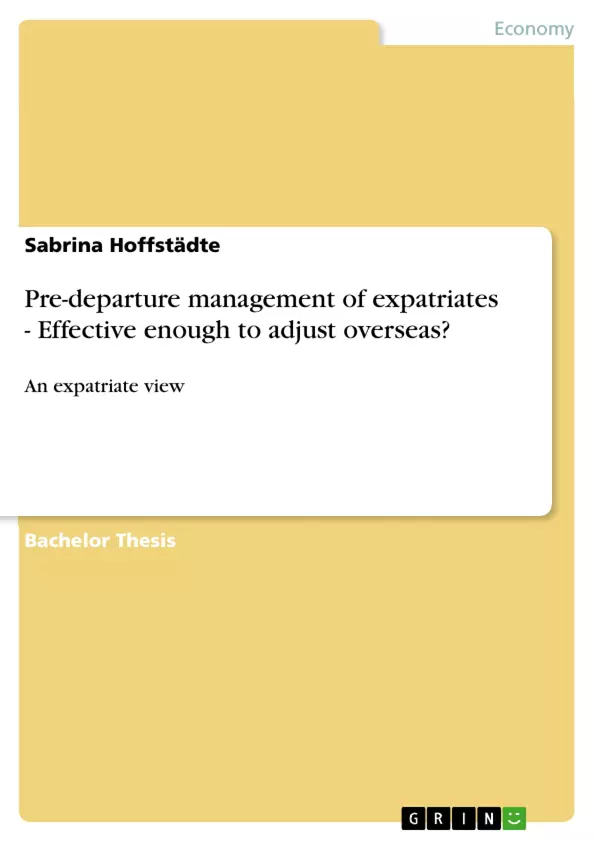The increasing globalisation of the world results in the internationalisation of companies which are impelled to send their most skilled employees abroad in order to conduct cross-border activities and to support the subsidiaries for a specific period of time. Those employees are called expatriates which are “gatekeepers” to other cultures. They are the ones who have to cope and work with people from different cultural backgrounds and are often faced with cultural differences or even conflicts.
This dissertation shows how important it is to select and train the right candidates for an international assignment in order to make their stay more effective and likewise successful. Besides, other aspects of the adjustment process of the expatriate and the accompanying spouse are highlighted.
In order to compare the theory presented in chapter two with the “real” world of expatriate management, expatriates from three different companies – SAP, Siemens and Bosch – have been questioned. The selection procedures of the companies as well as the effectiveness of the training have been analysed and were further commented by expatriates. Furthermore, adjustment problems and key factors for a successful stay abroad are mentioned, too.
Lastly, conclusions from the findings and analyses are presented which show that it is not only important to train international assignees but also to find someone who really wants to go abroad; someone who has the right mindset or to be precise an open-minded attitude towards people with different cultural values. Moreover, the adjustment and mental well-being of the spouse are key factors for a good adjustment and successful stay of the expatriate.
Inhaltsverzeichnis (Table of Contents)
- Chapter 1
- Introduction
- Reason for choice of topic
- Academic objectives of dissertation
- Outline of chapters
- Chapter 2 Literature Review
- Introduction
- The expatriate employee
- Failure rate
- Selection of expatriates
- Selection process
- Selection recommendations
- Preparation
- The need of cross-cultural competences
- Training of expatriates
- Adjustment
- Adjustment definition
- Expatriate adjustment
- Spouse adjustment
- The U-curve theory
- Introduction
- Chapter 3 Methodology
- Introduction
- Research purpose
- Research philosophy
- Research approach
- Research strategy
- The questionnaire
- Limitation of using questionnaires
- Ethical issues
Zielsetzung und Themenschwerpunkte (Objectives and Key Themes)
This dissertation aims to analyze the effectiveness of pre-departure management strategies for expatriates, focusing on their adjustment to overseas assignments. It investigates how companies select and train expatriates, and how these processes influence their success in adapting to a new culture and environment.
- Selection of expatriates for international assignments
- The role of training in preparing expatriates for cross-cultural challenges
- The process of expatriate adjustment and the factors influencing its success
- The importance of spouse adjustment in the overall expatriate experience
- The impact of cultural differences on expatriate effectiveness.
Zusammenfassung der Kapitel (Chapter Summaries)
Chapter 1 introduces the topic of pre-departure management for expatriates, highlighting its importance in the increasingly globalized business environment. It outlines the dissertation's academic objectives and provides a roadmap for the following chapters. Chapter 2 presents a comprehensive literature review on expatriate management. This chapter delves into the definition of an expatriate, discusses the challenges they face, explores the importance of cross-cultural competence, and examines the various aspects of selection, preparation, and adjustment. Chapter 3 focuses on the methodology employed in the dissertation. It details the research purpose, philosophy, approach, and strategy, outlining the use of questionnaires for data collection and addressing potential limitations and ethical considerations.
Schlüsselwörter (Keywords)
The dissertation focuses on the key areas of expatriate selection, training, adjustment, and assignment. The analysis draws upon research findings and practical insights to provide a comprehensive understanding of the challenges and opportunities associated with managing expatriates effectively. Key terms include expatriate management, cross-cultural competence, pre-departure training, adjustment, and cultural adaptation.
Frequently Asked Questions
What is the importance of pre-departure training for expatriates?
Pre-departure training is crucial for developing cross-cultural competence, helping employees cope with cultural differences and reducing the failure rate of international assignments.
How do companies like SAP, Siemens, and Bosch manage expatriates?
The dissertation analyzes their selection procedures and the effectiveness of their training programs based on feedback from actual expatriates working for these firms.
What is the 'U-curve theory' in the context of adjustment?
The U-curve theory describes the phases of cultural adjustment: from the initial 'honeymoon' stage to culture shock, and finally to gradual adjustment and mastery in the new environment.
Why is the spouse's adjustment critical for the expatriate's success?
Spouse adjustment and mental well-being are key factors; if the family fails to adapt, it often leads to the premature termination of the expatriate's assignment.
What mindset is required for a successful stay abroad?
Beyond technical skills, an open-minded attitude and a genuine desire to experience different cultural values are essential for long-term success overseas.
- Citation du texte
- Sabrina Hoffstädte (Auteur), 2007, Pre-departure management of expatriates - Effective enough to adjust overseas?, Munich, GRIN Verlag, https://www.grin.com/document/76431



